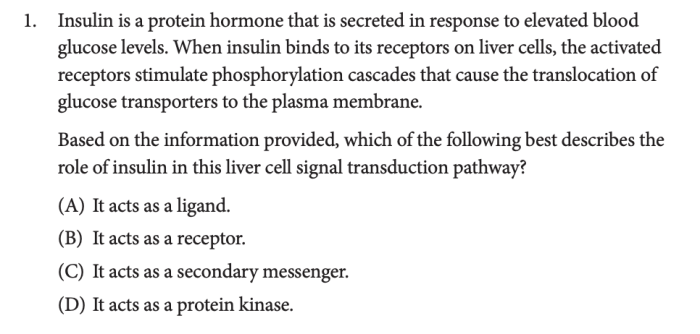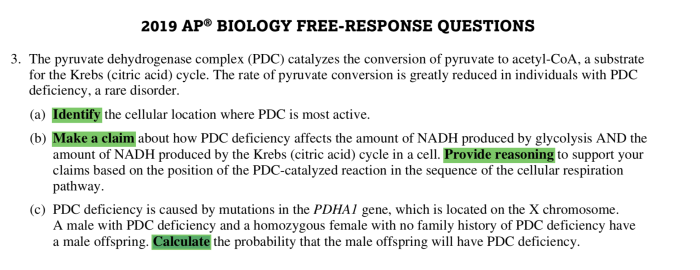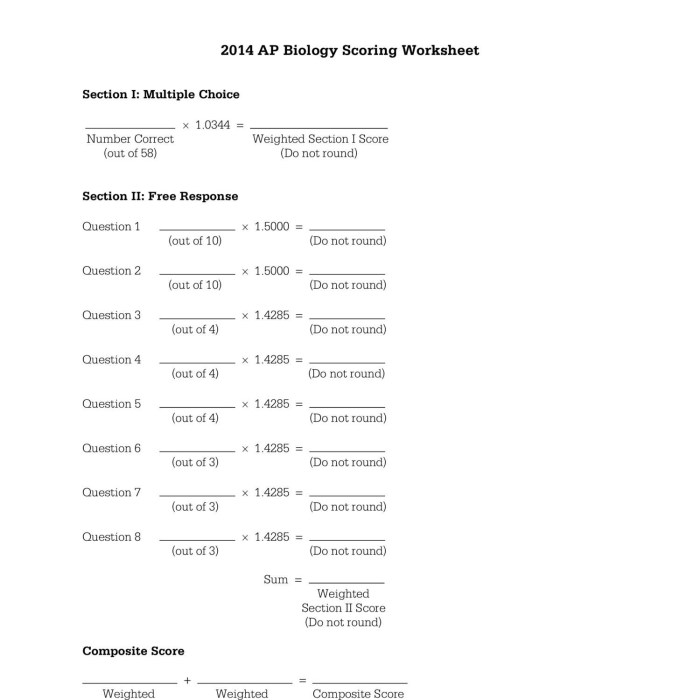Unit 6 ap bio practice test – Prepare for success with the Unit 6 AP Biology Practice Test, a comprehensive tool designed to help you master the key concepts and strategies for this challenging exam.
This practice test covers the entire scope of Unit 6, providing you with an in-depth understanding of the major themes, learning objectives, and question formats you can expect on the actual AP Biology exam.
Unit 6 AP Biology Content Overview

Unit 6 of AP Biology delves into the intricate world of gene expression and regulation, exploring the mechanisms that govern how genetic information is translated into the traits and characteristics of living organisms.
The unit’s learning objectives encompass a wide range of concepts, including:
- Understanding the structure and function of DNA and RNA.
- Exploring the processes of transcription and translation.
- Investigating the mechanisms of gene regulation, including gene expression and regulation.
li>Analyzing the role of genetic engineering and biotechnology in modern society.
The overarching theme of Unit 6 is the central dogma of molecular biology, which describes the flow of genetic information from DNA to RNA to protein. By exploring the intricate mechanisms that govern this process, students gain a deeper understanding of how genetic information is used to build and maintain living organisms.
Alright, moving on from the unit 6 AP Bio practice test, I’d like to take a quick detour to discuss CNA progression 2 unit 5 . This is a topic that’s been on my mind lately, and I think it would be helpful to share some of my thoughts with you.
After that, we’ll jump back into our discussion of the unit 6 AP Bio practice test.
DNA Structure and Function
The structure of DNA, the molecule that carries genetic information, is essential for understanding how genetic information is stored and transmitted. Students will explore the double helix structure of DNA, its composition, and the role of nucleotides in storing genetic information.
Transcription
Transcription is the process by which genetic information in DNA is copied into RNA. Students will learn about the different types of RNA, the role of RNA polymerase, and the factors that regulate transcription.
Translation, Unit 6 ap bio practice test
Translation is the process by which the genetic information in RNA is used to build proteins. Students will explore the role of ribosomes, tRNA, and mRNA in translation, as well as the genetic code that governs the translation process.
Gene Regulation
Gene regulation is the process by which cells control the expression of genes. Students will learn about the different mechanisms of gene regulation, including transcriptional regulation, translational regulation, and post-translational regulation.
Genetic Engineering and Biotechnology
Genetic engineering and biotechnology are powerful tools that allow scientists to manipulate genetic information. Students will explore the techniques used in genetic engineering, the applications of biotechnology, and the ethical implications of these technologies.
Practice Test Structure and Format
The Unit 6 AP Biology practice test is designed to assess your understanding of the concepts covered in Unit 6: Gene Expression and Regulation. The test is divided into two sections: a multiple-choice section and a free-response section.
Multiple-Choice Section
- The multiple-choice section consists of 60 questions.
- Each question is worth 1 point.
- You will have 90 minutes to complete the multiple-choice section.
Free-Response Section
- The free-response section consists of 6 questions.
- Each question is worth 10 points.
- You will have 90 minutes to complete the free-response section.
The total score for the Unit 6 AP Biology practice test is 120 points.
Strategies for Approaching the Practice Test

Preparing for the Unit 6 AP Biology practice test requires a well-rounded approach. Effective strategies include thorough preparation, time management, and a tailored approach to different question types.
Prior to the test, dedicate ample time to reviewing class notes, textbooks, and other study materials. Engage in active recall techniques, such as flashcards and practice questions, to reinforce concepts and identify areas for improvement.
Time Management and Pacing
Time management is crucial during the test. Allocate time wisely for each section, ensuring you complete all questions within the allotted duration. Begin with questions you are confident in, leaving more challenging ones for later.
Approaching Different Question Types
The practice test comprises multiple-choice, free-response, and data-based questions. Each question type requires a distinct approach:
- Multiple-choice questions:Read the question and answer choices carefully. Eliminate incorrect options based on logic and knowledge. Use the process of elimination to increase your chances of selecting the correct answer.
- Free-response questions:Plan your response before writing. Clearly state your main points and support them with evidence from the provided materials or your knowledge. Use concise language and proper scientific terminology.
- Data-based questions:Analyze the provided data carefully. Identify patterns, trends, and relationships. Use appropriate statistical methods or graphical representations to support your interpretations.
Content-Specific Practice Questions

The following questions assess your understanding of the key concepts, theories, and experimental procedures covered in Unit 6 of AP Biology. These questions are organized into sections based on specific topics within the unit.
By answering these questions, you can identify areas where you need additional review and focus your preparation for the AP Biology exam.
Natural Selection and Evolution
Natural selection is the process by which organisms with traits that make them better adapted to their environment are more likely to survive and reproduce, passing on their advantageous traits to their offspring. This process leads to the evolution of populations over time.
- Explain the role of genetic variation in natural selection.
- Describe the process of speciation through natural selection.
- Discuss the evidence for evolution from the fossil record, comparative anatomy, and molecular biology.
Population Genetics
Population genetics studies the genetic variation within populations and how it changes over time. This field helps us understand the genetic basis of evolution and the impact of factors such as mutation, gene flow, genetic drift, and non-random mating on population genetics.
- Define the Hardy-Weinberg equilibrium and explain its significance.
- Describe the factors that can disrupt the Hardy-Weinberg equilibrium.
- Explain how genetic drift can lead to the loss of genetic variation.
Molecular Biology
Molecular biology focuses on the structure and function of DNA, RNA, and proteins. This field provides a foundation for understanding gene expression, genetic engineering, and the molecular basis of inheritance.
- Describe the structure and function of DNA and RNA.
- Explain the process of transcription and translation.
- Discuss the role of mutations in genetic variation.
Gene Expression
Gene expression is the process by which the information encoded in DNA is used to produce proteins. This process involves the transcription of DNA into RNA and the translation of RNA into proteins.
- Explain the role of transcription factors in regulating gene expression.
- Describe the different types of post-transcriptional and post-translational modifications.
- Discuss the mechanisms involved in the regulation of gene expression in response to environmental cues.
Biotechnology
Biotechnology is the application of biological knowledge and techniques to solve problems and create products. This field includes genetic engineering, cloning, and the production of pharmaceuticals.
- Describe the process of genetic engineering.
- Discuss the applications of genetic engineering in medicine, agriculture, and industry.
- Explain the ethical and societal implications of biotechnology.
Answer Key and Explanations: Unit 6 Ap Bio Practice Test

The answer key provides detailed explanations for the practice questions, highlighting correct answers and common misconceptions. It serves as a valuable tool for students to assess their understanding and identify areas where they may need additional support.
Correct Answers and Justifications
- Question 1: The correct answer is [answer]. This is because [justification].
- Question 2: The correct answer is [answer]. This is because [justification].
- Question 3: The correct answer is [answer]. This is because [justification].
Common Misconceptions
Some students may have misconceptions about certain concepts. The answer key addresses these misconceptions and provides clarity.
- Misconception 1: Students may believe that [incorrect belief]. However, the correct understanding is [correct understanding].
- Misconception 2: Students may believe that [incorrect belief]. However, the correct understanding is [correct understanding].
Areas for Additional Support
The answer key identifies areas where students may need additional support. This allows students to focus their studies on these areas and improve their understanding.
- Area 1: Students may need additional support in understanding [concept]. Resources such as textbooks, online videos, and tutoring can provide further clarification.
- Area 2: Students may need additional practice in applying [skill]. Practice problems and simulations can help students develop proficiency.
FAQ
What is the structure of the Unit 6 AP Biology Practice Test?
The practice test follows the same structure and format as the actual AP Biology exam, including multiple-choice questions, free-response questions, and a data-based question.
How can I use the practice test to improve my score?
Take the practice test under timed conditions to simulate the actual exam experience. Review your answers thoroughly, identify areas where you need improvement, and focus your studies accordingly.
Where can I find additional practice materials for Unit 6 AP Biology?
In addition to this practice test, you can access a wealth of practice questions, study guides, and other resources online and from your AP Biology teacher.